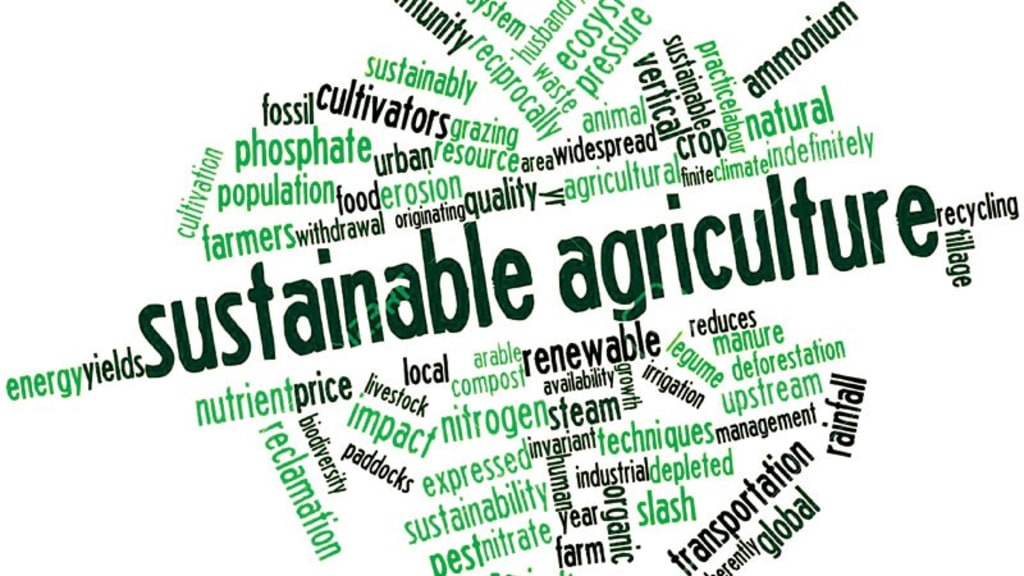Biotechnology and Its Role in Sustainable Agriculture
Feature image:

What is Biotechnology?
Biotechnology is an important feature of life sciences. It is the science-driven industry sector that creates use of living organisms and biology to supply healthcare-related products and therapeutics or to run processes (such as DNA fingerprinting). Biotechnology is best known for its increasingly important role within the fields of drugs and pharmaceuticals, and is additionally applied in other areas like genomics, food production, and therefore the production of biofuels. It uses cellular processes to develop products that help improve the health of the planet and lives of the people living in that planet. Biotechnology comprises of different disciplines, like, biology, physics, chemistry, mathematics, science, and technology. In the 21st century, biotechnology continues to create very notable contributions in extending the human lifespan and improving the standard of living through various ways, such as, providing products and therapies to combat diseases, generating higher crop yields, and using biofuels to scale back gas emissions.
Sustainable Agriculture
Since decades, farmers use traditional agriculture to produce bulk quantity of food. Every year the same process is repeated: Large farms, usage of tractors, huge amount of fertilizers and pesticides that damages the soil, land, air and climate. But in the 21st century, many farmers and scientists are moving towards a farming system that is more sustainable - environmentally, socially and economically.
Sustainable Agriculture produces a diverse range of foods, fuels and fibers adapted to regional markets and local conditions by using science-based practices that eventually maximizes productivity while minimizing environmental damage. A sustainable farm means natural systems and resources that farms rely on. It is a profitable business that contributes to a robust economy and it includes:
• Less or no water, air and climate pollution
• Maintaining healthy soil
• Promoting bio-diversity
Benefits of Agricultural Biotech Seeds
Decades of researches done in this field have shown that Agricultural biotechnology is beneficial and a very safe technology that contributes to both economic and environmental sustainability. Following are a few benefits resulting from using techniques for sustainable agricultural biotechnology:
1. Increased Productivity for Farmers:
Farmers love to use Agricultural biotechnology crops because they increase productivity and lower production costs. By using the environmental friendly biotech seeds for farming, farmers get greater financial returns as compared to the traditional farming methods. According to Global Impact of Biotech Crops: Income and Production Effects, US Farms profit are estimated at nearly $20 million which is a result of enhanced productivity from sustainable agriculture. new biotech technology has introduced disease resistance and drought tolerance which helps crops to grow without any harm.
2. Improved Food Quality and Taste:
Sustainable Agriculture has permitted new alternatives for progressing the nutritional value, flavor, and quality of food. Use of Agricultural Biotech Seeds in the long-run incorporate soybeans with higher protein content and potatoes with more nutritionally available starch. Flavors can be changed by improving the movement of plant enzymes that change aroma precursors into flavoring compounds.
3. Environmental Benefits:
Biotech varieties of Herbicide reduction has reduced the use of pesticides on farms. Secondly, with the assistance of life sciences consulting firms, farmers have adopted a new strategy "No and Reduced Tillage System" which utilizes herbicidal weed control instead of plowing. Plowing is a tool which helps in turning over the soil, bury crops and weeds in the soil and bring fresh soil on the top. By decreasing the usage of plowing farmers have to use less fuel and can store carbon dioxide in the soil only, this is equivalent to removing around 6.3 million cars from the road for one year. This in the future will improve soil health and water retention, fuel conservation and less greenhouse emissions. Moreover, reduction in pesticide will result in less underground exposure and farmer’s exposure to hazardous chemicals will also minimize. Biotech chemicals and seeds now represents half of the US cotton crop and has subsequently decreased world insecticide use by 15 percent.
Biotechnology: Toolbox to produce yield sustainability
Biotechnology can be utilized to fulfill the increasing demand of food by recuperating yields, nutritional quality of crops and reduce the hazardous effect on the environment. It takes around 10-12 years’ time to breed plants by utilizing conventional agricultural strategies. However, with present day biotechnology strategies, farmers can select a particular genetic characteristic from any plant they need and transfer it to another plant with greater effectiveness and precision. These tools also permit plant breeders to choose traits that would not be conceivable through conventional approaches. Biotechnology also plays an imperative part in advancement of crops which is resistant to salinity, drought, iron toxicity and alkalinity, which eventually leads to increase yield from less arable land.
Risks Associated with Biotech Sustainable Agriculture
Few environmentalists believe that there are some negative impacts of this biotech agriculture as well. some of these risks are:
1. Health Risks:
Modern biotechnology based strategies allow the distinguishing proof, characterization, and minimization of risk of food allergens. Genetically progressed crops and foods, and the hazard of allergens related with them, are presently a concern all through the world, particularly in industrial countries. In spite of the fact that no clear cases of destructive impacts on human health have been recorded from modern genetically improved food that does not mean that dangers don't exist.
2. Environmental Risks:
there are various risks associated with Biotech sustainable agriculture because plants produced by Biotechnological approaches:
• may transfer new and advanced genes into wild herbs,
• it may increase herbicide resistant weed,
• genetically modified plants may be hazardous to the wildlife as it produces toxic proteins, and
• Biotech methods can create new types of bacteria and viruses.
Conclusion
In this modern era, Biotechnology plays an important part in producing agricultural crops without using any harmful pesticides or sprays. Biotechnology has proven its role by increasing the production and productivity of agricultural products. However, there is still a need to adopt genetically modified crops by farmers at a large scale to fight with hunger problems in the world.
However, Biotechnology has both advantages and disadvantages discussed above, farmers, consumers and as a society everyone should understand where, when and how we can use biotech approaches and technology. This will help in improving the human health and will keep the environment pollution free.
About the Creator
William Patrick Slattery
William Patrick Slattery, the President, and CEO of Nieuw Amsterdam Advisors, a life sciences consulting firm. He is regarded as one of the top marketing experts in the Life Sciences industry






Comments
There are no comments for this story
Be the first to respond and start the conversation.